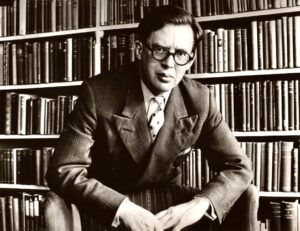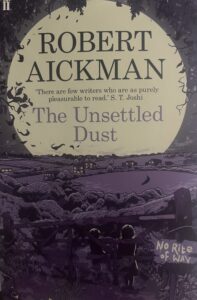
The Unsettled Dust is a collection of short stories by the great Robert Aickman (1914-1981), an English writer and conservationist highly esteemed by horror genre authors and fans, despite his relatively small output of 48 stories. Aickman called his works “strange stories,” a far better description of them than horror stories or tales of terror or ghost stories.
Aickman came to my attention years ago when I stumbled upon a story of his in a large horror anthology. The story was called The Hospice, one of Aickman’s best and most well-known. It tells the tale of a man, Marbury, who finds himself lost in the country on a dark night while driving and seeks refuge in a hospice he chances upon. Although everything seems rather normal at first, a series of strange occurrences increasingly unnerve him. Marbury slowly but surely moves from a state of relief at finding shelter to one of anxiety and fear — bringing us, the readers, right along with him.
 The Hospice is typical Aickman. It begins with a familiar situation and characters, and bit by bit grows more and more unusual and unsettling. Aickman usually only hints at the strangeness, providing vague clues open to interpretation. This method creates in the reader an ever-growing and definite sense of dread, but without a clear understanding of what exactly it is that is dreadful. For instance in The Hospice (not included in The Unsettled Dust), Marbury notices one of the residents has his ankle chained to the table at dinner, but is otherwise perfectly ordinary. No definitive explanation is forthcoming. In No Stronger than a Flower, Nesta, the wife, begins out of the blue to wear a veil, and continues to do so for months, making it impossible for her husband to see her face. Although something frightening lies behind the veil, we are never precisely sure what. My guess is Aickman had a crystal clear conception of the causes of the horrors he hints at, but respected his readers too much to hit them over the head with an explanation. This respect for the reader, this door to clarity left only so slightly ajar, is what makes Aickman’s stories so much fun to read. I greatly dislike open-ended stories in which you are left simply frustrated, wondering whether, say, the protagonist actually ends up being murdered or only imagines it. But with Aickman, the effect is much more subtle; you are never left wondering whether “A” happened or “B” happened, you are simply left wondering, What happened? And as you reflect, you realize things were a lot weirder and more dreadful that you initially thought, regardless of the precise nature of the outcome. No matter how you interpret the events of the story, you are lead to the same sense of bewilderment and intense unease — much like his protagonists.
The Hospice is typical Aickman. It begins with a familiar situation and characters, and bit by bit grows more and more unusual and unsettling. Aickman usually only hints at the strangeness, providing vague clues open to interpretation. This method creates in the reader an ever-growing and definite sense of dread, but without a clear understanding of what exactly it is that is dreadful. For instance in The Hospice (not included in The Unsettled Dust), Marbury notices one of the residents has his ankle chained to the table at dinner, but is otherwise perfectly ordinary. No definitive explanation is forthcoming. In No Stronger than a Flower, Nesta, the wife, begins out of the blue to wear a veil, and continues to do so for months, making it impossible for her husband to see her face. Although something frightening lies behind the veil, we are never precisely sure what. My guess is Aickman had a crystal clear conception of the causes of the horrors he hints at, but respected his readers too much to hit them over the head with an explanation. This respect for the reader, this door to clarity left only so slightly ajar, is what makes Aickman’s stories so much fun to read. I greatly dislike open-ended stories in which you are left simply frustrated, wondering whether, say, the protagonist actually ends up being murdered or only imagines it. But with Aickman, the effect is much more subtle; you are never left wondering whether “A” happened or “B” happened, you are simply left wondering, What happened? And as you reflect, you realize things were a lot weirder and more dreadful that you initially thought, regardless of the precise nature of the outcome. No matter how you interpret the events of the story, you are lead to the same sense of bewilderment and intense unease — much like his protagonists.
Aickman writes with wit and often weaves quite serious themes into his stories; No Stronger Than a Flower has much to say about marital relationships; The Houses of the Russians offers some rather wryly perceptive insights about business dealings and business relationships. The Stains, one of Aickman’s last stories, is relatively complex and thematically sweeping, with commentary on such things as modernity, tradition and empire, boredom, lust, and death.
Another appealing feature of Aickman’s singular style is his matter-of-fact narration. Have you ever tried to recount one of your dreams to someone? Typically when we do this there is little embellishment: first this happened, and then that happened, and finally this third thing happened. The straightforward and detailed accounting of events, rather than detracting from the dream’s weirdness, instead intensifies it. Aickman uses the same less-is-more technique in his strange stories to heat up the atmosphere:
“‘Normally I should have supposed the house to be empty, but that was not so. There was a fence round the garden, a heavy wooden paling, something with the weight and solidity of the wooden railing across the footbridge. Even so, there were gaps in it, and there was also a gate, which was lower than the rest of the fence. I had been creeping along the fence looking through the gaps, but it was across the top of the gate that I saw a woman sitting among the long grass and in all that mist. She was not a young girl, but she had very fair hair, tied up at the back of the head. She wore a loose brown dress and she was doing something with a machine of some kind, not spinning, but possibly weaving, or possibly something quite different. I don’t know what it was, but it seemed to me a very odd time and place to do it. …'” (Robert Aickman, The Houses of the Russians)
Who is this woman? What is she doing? Why is she doing it? Is she real? Is she a figure of the man’s imagination? In the end we will understand enough to preserve the chill, rest assured.
Here is a quick summary of contents of The Unsettled Dust, a collection first published in 1990, after Aickman’s death. These stories had appeared earlier in other publications.
- The Unsettled Dust. A man discovers two sisters living in an old, rundown estate are a lot weirder than they appear … and they appear pretty weird.
- The Houses of the Russians. In Finland, a young English businessman ventures onto a heavily forested and foggy island with a past as mysterious as its present.
- No Stronger than a Flower. It turns out that Curtis and Nesta, a married couple somewhat happy on the surface, really aren’t getting along so well.
- The Cicerones. A young man on holiday in Belgium gets more than he bargained for on a tour of a rather odd church.
- The Next Glade. A married Englishwoman with two children considers having an affair with a man who, to put it mildly, comes and goes.
- Ravissante. Back to Belgium. A young painter finds an old woman much stranger than the strange artwork of the masters he admires and himself creates. (Aickman refers to many real Belgian artists in this story: creep yourself out further by checking out their paintings.)
- Bind Your Hair. If you’re looking for a way to better enjoy a visit with your in-laws, this story won’t help.
- The Stains. A recently widowed English civil servant thinks he has found true love again, but it appears that something other than true love has found him.

Nancy Who? 🙂